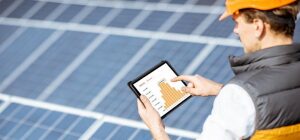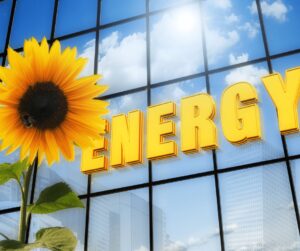Living off the grid and generating your own electricity using solar power plants may seem like a pipe dream to many. However, this is a completely achievable goal. In fact, it is a movement that is becoming more and more popular every day.
Advances in solar technology and energy storage have made it possible to use the sun to power our homes and appliances. This is true even when the grid is down.
Solar energy systems have changed the way we generate energy. The installation of solar panels has made it possible to generate electricity from clean energy sources such as the sun.
The panel system is used to convert sunlight into direct current (DC) electricity. This DC electricity is then converted into AC electricity. This AC electricity can be used to power appliances and electronics in the home.
Stand-alone solar power plants use lead-carbon or lithium-ion AGM batteries. These batteries store excess electricity generated during the day. This surplus electricity allows for the supply of electricity at night or on cloudy days. Thanks to this technology, disconnecting from the grid and generating your own electricity has become a real possibility.
By using solar power plants, we can reduce our carbon footprint, become self-sufficient and enjoy a sustainable lifestyle. Proper maintenance and monitoring of components is essential for an efficient and productive off-grid system.
Advances in solar energy and energy storage make it possible to generate clean energy from the sun.
In this article, we will talk about the benefits of off-grid solar power and how you can start working with them.
What does it mean to go offline?
Going off-grid means disconnecting from traditional energy sources such as utilities. Individuals or households may choose to generate their own electricity instead of relying on publicly provided energy sources. This electricity can be generated using renewable energy sources such as solar power.
An off-grid system is an option for those who want to be self-sufficient. An off-grid system consists of several important parts. These include solar panels, charge controllers, AGM or lithium batteries, chargers, stand-alone inverters, and power output monitoring systems.
You can design your own system using the tools in our Resource Library or purchase a complete kit. We have off-grid kits of all sizes, including our starter kits, cottage kits, tiny house kits and off-grid home kits.
Solar panels are the backbone of off-grid solar systems, as they convert sunlight into electrical energy.
Charge controllers regulate the amount of energy that flows from the solar panels to the batteries, protecting them from overcharging.
Batteries store the electrical energy generated by the solar panels, and chargers ensure that they are always fully charged.
Stand-alone inverters convert the direct current (DC) energy stored in the batteries into alternating current (AC) energy. This AC power is then used to power appliances and other devices in the home. The stand-alone inverter must manage the output power from the batteries. It must also regulate the amount of power used at any given time.
The latest innovation in off-grid technology is the pre-connected power panel. The power panel combines the inverter, charge controller, charger, control switches and other components into a single system. Power panels are the heart of your system, and pre-wiring them can save over 40 hours of labour.
How solar energy works
Solar power plants generate electricity from sunlight using photovoltaic (PV) cells. These cells convert sunlight into direct current (DC) electricity. An inverter converts the DC to AC. This type of electricity can be used to power household appliances and electronics.
Photovoltaic cells contain semiconductor materials such as silicon. Sunlight is absorbed by these materials and photons knock electrons out of the atoms. This causes a flow of electrons that can be used as electricity. This process is called the photovoltaic effect, and it is what makes solar power plants work.
The amount of electricity generated by solar power plants depends on the amount of sunlight. Solar panels are often installed on roofs or in places that receive a lot of sunlight during the day. This is because they need to be exposed to sunlight to produce energy.
Solar power plants can include batteries, and they are an essential element of off-grid systems. These batteries store excess electricity generated during the day. This electricity can then be used at night or during low solar activity.
Solar power plants are reliable and renewable sources of electricity. They can help reduce your carbon footprint and your electricity bills. They can also allow you to live off the grid and enjoy a self-sufficient lifestyle.
Off-grid solar power plants: What you need to know
When it comes to off-grid living, solar energy is one of the most popular and effective options.
One of the key considerations when installing an off-grid solar power system is sizing it. Make sure your system is capable of providing enough power to meet your needs. This should be true even in low sunlight conditions. This usually requires calculating your daily energy consumption, as well as taking into account seasonal fluctuations and weather conditions.
Switching to off-grid solar power requires more than just the basic components of the system. There are other factors to consider as well. For example, you may need to invest in a backup generator to provide power during long periods of low solar activity.
To maximise your investment, change your energy consumption habits. Invest in more energy-efficient appliances and devices. Make sure your system can meet your needs.
A stand-alone solar power system is a great option for those who want to get off the grid or provide electricity to remote locations. It allows you to live a more sustainable and self-sufficient lifestyle.
Advantages of autonomous power supply from solar energy
Switching to off-grid solar power offers many benefits, ranging from financial savings to environmental impact. Here are some of the benefits you can expect:
Becoming energy independent is possible. Going off-grid means you can be self-sufficient in terms of energy. You no longer need to depend on the power grid. This way, you will not be dependent on power outages, grid maintenance or other interruptions, as well as the high cost of delivering electricity to remote areas.
Solar energy is a clean and renewable source of energy. This means that it has a lower environmental impact than traditional energy sources such as fossil fuels. By using solar power off-grid, you can reduce your carbon footprint and contribute to a more sustainable future. You can also eliminate the need for a generator or reduce the time it runs, making your life more peaceful and relaxing.
Switching to solar energy increases resilience. This will help you be more prepared for natural disasters, power outages and other disruptions. Your solar power plant will continue to provide you with energy even if the grid fails.
Switching to off-grid solar power gives you freedom. You can live anywhere without worrying about being connected to the grid. This means you can live in remote or rural areas without sacrificing modern conveniences.
There are many advantages to being powered by solar energy. It is an attractive option for those who want to reduce their dependence on traditional energy sources. It is important to do your research before deciding to go off-grid. Consider whether it fits your lifestyle.
Life offline: Is it right for you?
Living off the grid is an attractive choice for those who want to reduce their dependence on traditional energy sources. Solar energy can help them become more self-sufficient. Here are a few factors to consider before going off-grid:
1. Location: Off-grid living with solar power is best suited to areas with sufficient sunlight. In places where there is no direct sunlight, it may be difficult to generate enough power to meet your needs.
2. Energy consumption: If you rely heavily on electrical devices and appliances and have a very high energy consumption, it may not be the best option to go off-grid. It is important to be aware of your energy consumption and invest in efficient appliances and devices.
3. Cost: The initial cost of installing an off-grid solar power system can be significant, but it doesn’t have to be. You can start small and build up over time.
4. Lifestyle: Living off the grid often requires a more self-sufficient lifestyle. You may need to learn new skills, such as gardening, food preservation and basic home repairs, if you find yourself very far from services. It is important to consider whether this lifestyle is in line with your values and interests.
Ultimately, living off the grid on solar energy can be a rewarding and sustainable lifestyle. However, it is important to consider the practicalities and determine if it is the right choice for you and your family.







